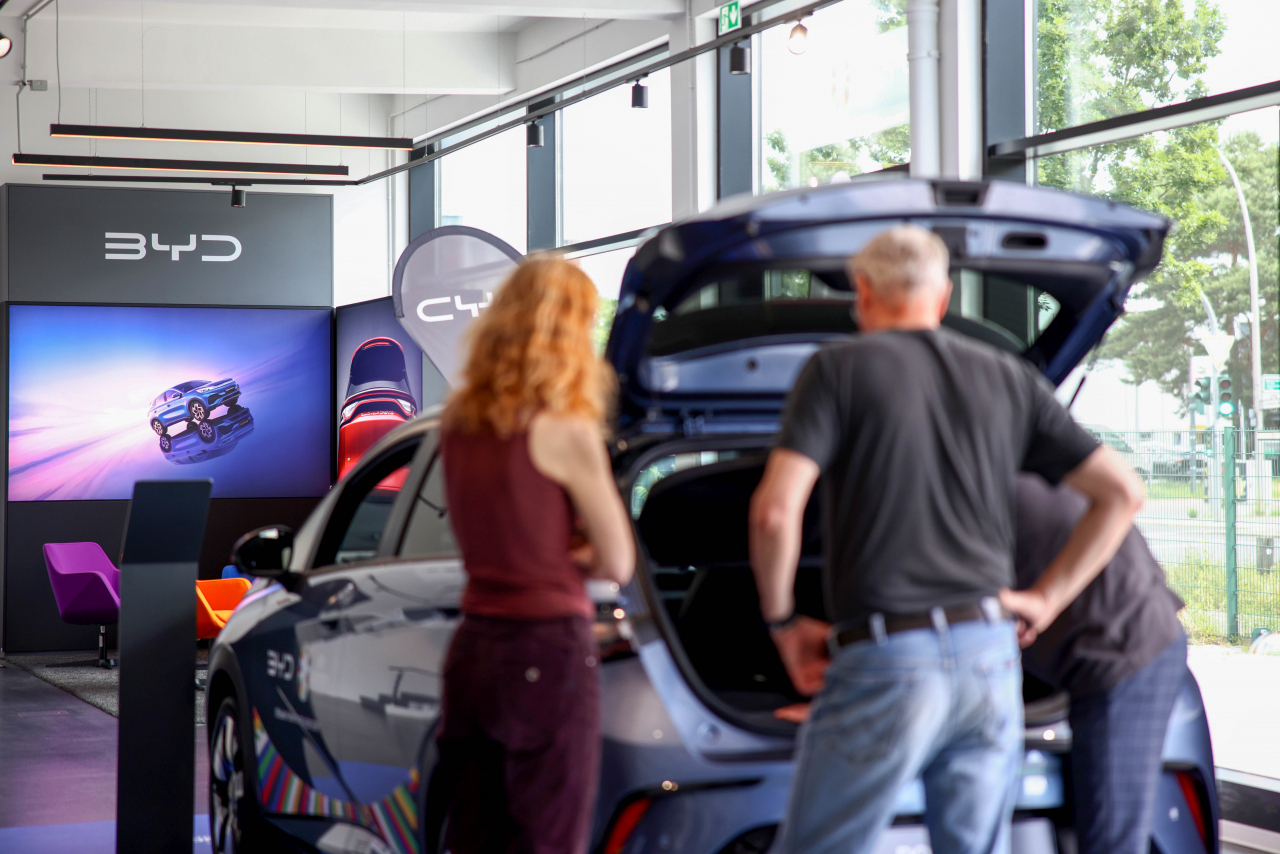 |
Customers browse electric vehicles at a BYD showroom in Berlin. (Bloomberg) |
Donald Trump’s impending return to the White House has reignited fears of trade protectionism in the global auto industry. But the real question for automakers may not be about tariffs or changes to the Inflation Reduction Act. Trump’s stance on Chinese electric vehicles could have a greater impact, especially as Chinese automakers continue their aggressive push into global markets.
For South Korean automakers Hyundai Motor and Kia, who face the mounting pressure of China’s rapid rise in the EV space, Trump’s policies could buy them valuable time to strengthen their footing in the US.
Capitalizing on US-China tensions
China has emerged as the world’s EV powerhouse. In 2023, China exported 4.9 million vehicles -- more than any other country, including Japan -- and about 1.2 million of those exports were EVs. Brands like BYD and Nio are surging both domestically and overseas, particularly in Europe, where they are undercutting Western automakers on price and technology. By the middle of this year, EVs made up more than 50 percent of new car sales in China, a pace that has left the US and Europe far behind.
To counter China’s influence in the EV market, both the US and European Union have recently imposed high tariffs on Chinese electric vehicles -- 100 percent in the US and 27 to 45 percent in the EU. The Biden administration in the US even implemented a ban on certain Chinese software and hardware related to connected vehicles, with restrictions set to phase in by 2027. Trump’s return signals a likely continuation, or even escalation, of these protectionist policies.
“If Trump intensifies restrictions on Chinese EVs, it could provide a crucial buffer period for US and foreign automakers, including Hyundai and Kia, to strengthen their EV lineups without facing immediate competition from low-cost Chinese rivals,” explained analyst Yim Eun-young from Samsung Securities.
Hyundai, Kia bet big on American-made
One of Trump’s flagship proposals is a 10 percent universal tariff on imported vehicles, up from the existing rate of 2.5 percent. “In an ideal scenario, Korean automakers might find some relief under the US-Korea Free Trade Agreement, which has shielded Korean cars from most US tariffs, excluding the 25 percent duty on pickup trucks,” explained Kang Goo-sang, head of North American and European market research at the Korea Institute for International Economic Policy. This existing trade relationship could be a key advantage if Trump’s administration imposes broader import duties.
Meanwhile, with Trump poised to maintain or increase tariffs on Chinese EVs, Hyundai Motor and Kia may be well-positioned to benefit at least in the near future. They have already committed to building EV production capacity within the US, aiming to reduce reliance on imports and take advantage of local manufacturing incentives. Hyundai Motor’s new plant in Savannah, Georgia, is set to start production by 2025 and ramp up to 500,000 units annually by 2028,
By ramping up their US-based production, Hyundai Motor and Kia not only avoid potential tariffs, but also qualify for incentives under the IRA, which provides subsidies of up to $7,500 for US-made EVs. Models like the Hyundai Ioniq 5 and Kia EV9 already meet these requirements, helping the brands compete with domestic players like Tesla and legacy US automakers.
However, Trump’s suggested rollback of the IRA’s green incentives does add a layer of uncertainty.
If Trump weakens or repeals the IRA, which he has promised to do, it could slow the growth of the US EV market by making EVs less affordable. But analyst Yim suggests this could actually benefit Hyundai and Kia in an indirect way. “With fewer subsidies for EVs, American consumers may lean toward more affordable hybrid and internal combustion vehicles -- segments where Hyundai and Kia also have strong lineups, unlike Chinese rivals, ” she said.
Emissions rollback to boost gas cars
Trump’s administration is also expected to relax fuel economy and emissions standards. During his first term, Trump rolled back fuel efficiency requirements, setting a precedent that his current administration may follow. “A rollback of Biden-era standards could slow EV adoption further, as the regulatory push for cleaner vehicles eases. This change would favor automakers with strong internal combustion engine lineups, including Hyundai and Kia, which still produce popular gas-powered SUVs that Chinese brands aren’t positioned to compete with,” said Kim Kyeong-yoo, a senior researcher at the Korea Institute for Industrial Economics and Trade
However, in a world where EV adoption is accelerating -- particularly in China, where over 100 new EV models hit the market each year -- an internal combustion engine-focused strategy in the US may only be a temporary reprieve. “While lower fuel economy standards may temporarily help legacy automakers, the global shift toward EVs is inevitable,” said Kim.







![[Herald Interview] How Gopizza got big in India](http://res.heraldm.com/phpwas/restmb_idxmake.php?idx=644&simg=/content/image/2024/11/20/20241120050057_0.jpg)